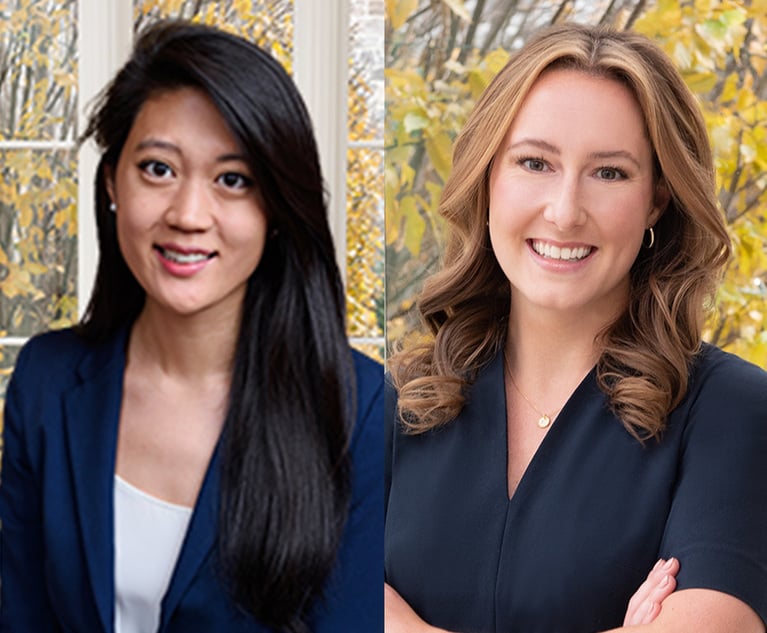Debra Katz: Kavanaugh Accuser Is Willing to Testify About Misconduct Claims
"My client will do whatever is necessary to make sure that the Senate Judiciary Committee has the full story and the full set of allegations to allow them to make a fully informed decision," Debra Katz of Washington's Katz, Marshall & Banks said Monday.
September 17, 2018 at 08:35 AM
5 minute read
 Judge Brett Kavanaugh was nominated to the Supreme Court at a White House ceremony on July 9. (Photo: Diego M. Radzinschi/ ALM)
Judge Brett Kavanaugh was nominated to the Supreme Court at a White House ceremony on July 9. (Photo: Diego M. Radzinschi/ ALM)
Updated 10:40 a.m.
Christine Blasey Ford, who alleges Supreme Court nominee Brett Kavanaugh sexually assaulted her decades ago in their high school years, is willing to testify before the Senate Judiciary Committee, her lawyers said Monday.
Debra Katz, the Washington civil rights attorney and an attorney for Ford, said no one from the Senate Judiciary Committee has asked Ford to testify.
“My client will do whatever is necessary to make sure that the Senate Judiciary Committee has the full story and the full set of allegations to allow them to make a fully informed decision,” Katz, of Washington's Katz, Marshall & Banks, said on the news program “CBS This Morning.” “She's willing to do what she needs to do. She's willing, hopefully, to tell her story in a manner that is a fair proceeding.”
Some Senate Republicans are working toward arranging phone conversations with Ford and Kavanaugh, but the news that Ford is willing to testify publicly might make that option more difficult.
Debra Katz, the lawyer of Brett Kavanaugh's accuser, says her client is "willing to do what she needs to do" before the Senate Judiciary Committee as Republicans prepare to grill her over sexual misconduct allegations against the Supreme Court nominee. https://t.co/OEeVP7B0Rs pic.twitter.com/4LVctXpJoE
— CBS News (@CBSNews) September 17, 2018
Katz said Monday on CNN: “We've heard from no one. We've seen various statements made on television—statements that are being bandied about for political reasons. But no one's asked her.”
Another lawyer for Ford, Lisa Banks, also at the firm Katz, Marshall & Banks, told NPR, “She will agree to participate in any proceedings that she's asked to participate in.” She also said that Ford's recollections of the assault were “crystal clear.”
Kavanaugh said in a statement Monday:
“This is a completely false allegation. I have never done anything like what the accuser describes—to her or to anyone.
“Because this never happened, I had no idea who was making this accusation until she identified herself yesterday.
“I am willing to talk to the Senate Judiciary Committee in any way the Committee deems appropriate to refute this false allegation, from 36 years ago, and defend my integrity.”
Ford, a Palo Alto professor, spoke publicly to The Washington Post in an interview published online Sunday. The claims—that Kavanaugh, then 17, pinned her to a bed at a party and covered her mouth—roiled the confirmation process just days before a scheduled committee vote. Kavanaugh, a judge on the U.S. Court of Appeals for the D.C. Circuit, was deemed likely to be confirmed.
Kavanaugh has not publicly addressed the allegations against him. Kavanaugh's backers have pointed to many letters published in recent weeks—as part of the confirmation process—touting Kavanaugh's advocacy for women. Those letters include statements from his former female clerks, praised Kavanaugh for helping end disparities and hardships for women in the law.
Ford first made her claims against Kavanaugh in a letter to her congresswoman. That letter was later transmitted to Sen. Dianne Feinstein, D-California, the ranking members on the Senate Judiciary Committee. Ford asked that she remain anonymous and that her claims be kept confidential.
The first public hint of the controversy came in a report at the Intercept last week that Feinstein was keeping a letter from other members of the Judiciary Committee. In aftermath of that reporting, Ford's claims would be revealed by The New Yorker.
“There was a great deal of ambivalence about whether she wanted to be publicly associated with these allegations,” Katz said Monday. “Essentially that choice was made by her to remain confidential. She asked Sen. Feinstein to keep her letter and her allegations confidential, and Feinstein agreed to do that.”
Katz said some news reporters, aware of Ford's identity, reached out in person to talk with her and emailed and called her. “She knew that her allegations were going to be outed, and that in fact is what occurred,” Katz said Monday. “As a result, she decided to take control of this to tell this in her own voice.”
Read more:
Kavanaugh Accuser, Speaking Publicly, Puts New Pressure on Republicans
#MeToo Whistleblower Lawyer Makes Waves in Washington
Brett Kavanaugh Controversy Recalls Past Confirmation Tussles
Kavanaugh's Female Clerks Tout His Advocacy for Female Lawyers
This report was updated to include Kavanaugh's statement Monday.
This content has been archived. It is available through our partners, LexisNexis® and Bloomberg Law.
To view this content, please continue to their sites.
Not a Lexis Subscriber?
Subscribe Now
Not a Bloomberg Law Subscriber?
Subscribe Now
NOT FOR REPRINT
© 2025 ALM Global, LLC, All Rights Reserved. Request academic re-use from www.copyright.com. All other uses, submit a request to [email protected]. For more information visit Asset & Logo Licensing.
You Might Like
View All
Am Law 100 Lateral Partner Hiring Rose in 2024: Report


Trending Stories
- 1Uber Files RICO Suit Against Plaintiff-Side Firms Alleging Fraudulent Injury Claims
- 2The Law Firm Disrupted: Scrutinizing the Elephant More Than the Mouse
- 3Inherent Diminished Value Damages Unavailable to 3rd-Party Claimants, Court Says
- 4Pa. Defense Firm Sued by Client Over Ex-Eagles Player's $43.5M Med Mal Win
- 5Losses Mount at Morris Manning, but Departing Ex-Chair Stays Bullish About His Old Firm's Future
Who Got The Work
J. Brugh Lower of Gibbons has entered an appearance for industrial equipment supplier Devco Corporation in a pending trademark infringement lawsuit. The suit, accusing the defendant of selling knock-off Graco products, was filed Dec. 18 in New Jersey District Court by Rivkin Radler on behalf of Graco Inc. and Graco Minnesota. The case, assigned to U.S. District Judge Zahid N. Quraishi, is 3:24-cv-11294, Graco Inc. et al v. Devco Corporation.
Who Got The Work
Rebecca Maller-Stein and Kent A. Yalowitz of Arnold & Porter Kaye Scholer have entered their appearances for Hanaco Venture Capital and its executives, Lior Prosor and David Frankel, in a pending securities lawsuit. The action, filed on Dec. 24 in New York Southern District Court by Zell, Aron & Co. on behalf of Goldeneye Advisors, accuses the defendants of negligently and fraudulently managing the plaintiff's $1 million investment. The case, assigned to U.S. District Judge Vernon S. Broderick, is 1:24-cv-09918, Goldeneye Advisors, LLC v. Hanaco Venture Capital, Ltd. et al.
Who Got The Work
Attorneys from A&O Shearman has stepped in as defense counsel for Toronto-Dominion Bank and other defendants in a pending securities class action. The suit, filed Dec. 11 in New York Southern District Court by Bleichmar Fonti & Auld, accuses the defendants of concealing the bank's 'pervasive' deficiencies in regards to its compliance with the Bank Secrecy Act and the quality of its anti-money laundering controls. The case, assigned to U.S. District Judge Arun Subramanian, is 1:24-cv-09445, Gonzalez v. The Toronto-Dominion Bank et al.
Who Got The Work
Crown Castle International, a Pennsylvania company providing shared communications infrastructure, has turned to Luke D. Wolf of Gordon Rees Scully Mansukhani to fend off a pending breach-of-contract lawsuit. The court action, filed Nov. 25 in Michigan Eastern District Court by Hooper Hathaway PC on behalf of The Town Residences LLC, accuses Crown Castle of failing to transfer approximately $30,000 in utility payments from T-Mobile in breach of a roof-top lease and assignment agreement. The case, assigned to U.S. District Judge Susan K. Declercq, is 2:24-cv-13131, The Town Residences LLC v. T-Mobile US, Inc. et al.
Who Got The Work
Wilfred P. Coronato and Daniel M. Schwartz of McCarter & English have stepped in as defense counsel to Electrolux Home Products Inc. in a pending product liability lawsuit. The court action, filed Nov. 26 in New York Eastern District Court by Poulos Lopiccolo PC and Nagel Rice LLP on behalf of David Stern, alleges that the defendant's refrigerators’ drawers and shelving repeatedly break and fall apart within months after purchase. The case, assigned to U.S. District Judge Joan M. Azrack, is 2:24-cv-08204, Stern v. Electrolux Home Products, Inc.
Featured Firms
Law Offices of Gary Martin Hays & Associates, P.C.
(470) 294-1674
Law Offices of Mark E. Salomone
(857) 444-6468
Smith & Hassler
(713) 739-1250









